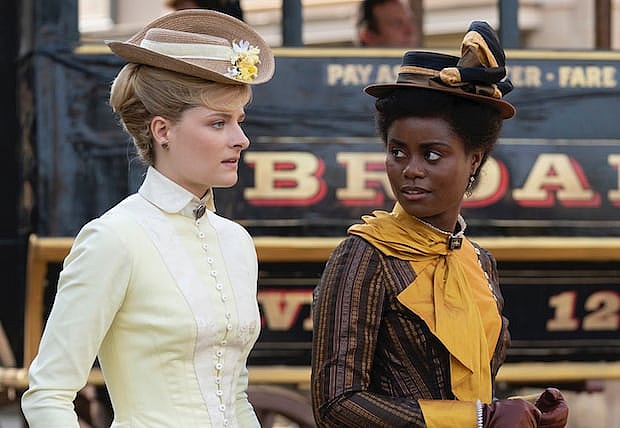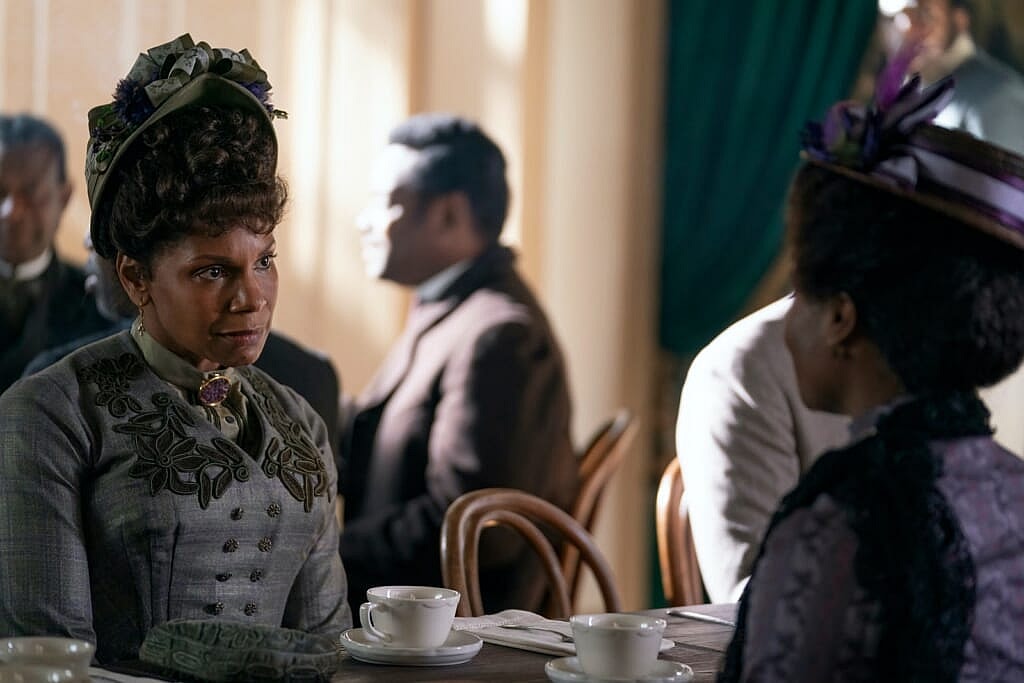HBO may have a hit on its hands if the first few episodes of The Gilded Age are any indication of what’s to come.
From Julian Fellowes, the creator of Downton Abbey, comes the series that’s set in New York City in 1882 and explores a part of the Black experience that’s seldom seen onscreen.
Denee Benton plays Peggy Scott, an aspiring writer who befriends a young white woman named Marion Brooks (played by Meryl Streep’s daughter, Luisa Jacobsen) and ends up working as a secretary in the home owned by Marion’s old-money aunts.

While most projects that reflect this time period erase the Black elite from the story, The Gilded Age finally illuminates the fact that the Black elite existed, and in many ways, were thriving before it all came crashing back down.
Peggy’s mother, Dorothy Scott, is the wife of a pharmacist and played perfectly by Audra McDonald. The incomparable actress spoke about why she took on the role during a recent interview on Acting Up.
“People forget that during Reconstruction, with the constitutional amendments and emancipation and the end of slavery and giving Black men the right to vote and hold office, a lot of formerly enslaved people made big strides very quickly,” she said.
“Blacks had their own communities in Brooklyn and what was called ‘the Tenderloin’ at the time. They needed to have businesses to serve their own communities, and so that’s how you ended up with Black pharmacists and dentists and doctors and undertakers and lawyers and all of that. We needed all these things to serve our own communities — our own thriving communities, and there was a social structure that existed within that.”
“I just didn’t want to perpetuate a tired old stereotype that we might have seen way too many times at this point. So I was very nervous. And I read that first script that my character was involved in, and I was like, ‘Oh, what? Yes. Yes, please. Yes, let’s tell this story with all of its intricacies and all of its mess.”

A lot of the history we are seeing explored in the series was informed by the show’s historical consultant and co-executive producer, Erica Dunbar, who said she was happy to shed light on the real-life experiences of the Black elite.
“We get to see through the Scotts that we’re a generation or two removed from slavery and there are folks who are living, who are loving, who are worshiping, who are attempting to build wealth all within with the indignities of racism around them,” she explained.
Dunbar said that the show presents an opportunity to change the ways in which we teach and learn about Black history, which almost often only references times of lynching and intense racism.
“When we think about people like T. Thomas Fortune who created The Globe, who are writing the most well-read Black newspaper, it’s like ‘Yes… Black folks ARE reading the newspaper. Yes, they’re getting news. Yes, they’re thinking about politics. They’re thinking about themselves as Republicans at that time.’ And it is a part of that world. And so this is a great opportunity to open up the public imagination about Black life in the late 19th century.”
The show also illuminates the fact that, for Black people then and now, wealth does not always excuse us from violence, fear, or racism. Peggy’s parents are less than thrilled when they learn she has taken a job in a white woman’s house on the Upper East Side, and insist that she come back to Brooklyn where she belongs. While some viewers may assume their stance is based on the notion that Peggy is too good for her gig, Dunbar reminds us there’s much more to consider.
“It wasn’t just about her doing a job that was beneath her because she was the secretary, right? And that was not necessarily beneath them. But there is also the fear and concern about what it means to send a young, Black woman into a white household every day to work where she sleeps; where she lives, right? There are very real concerns about being able to protect a Black woman’s body in those spaces on the Upper East Side. That would have been an impossibility for the Scotts,” said Dunbar.
Check out new episodes of The Gilded Age on Monday nights on HBO and check out our full conversations with Audra McDonald and Erica Dunbar on the latest episode of Acting Up.
TheGrio is now on your TV via Apple TV, Amazon Fire, Roku, and Android TV. Also, please download theGrio mobile apps today!

